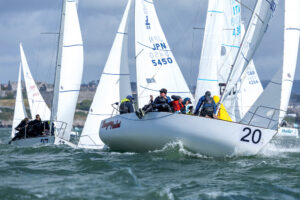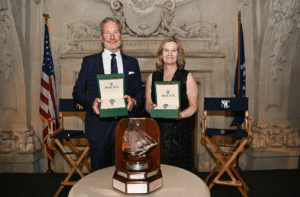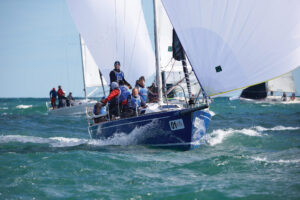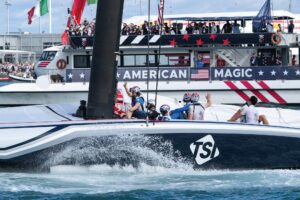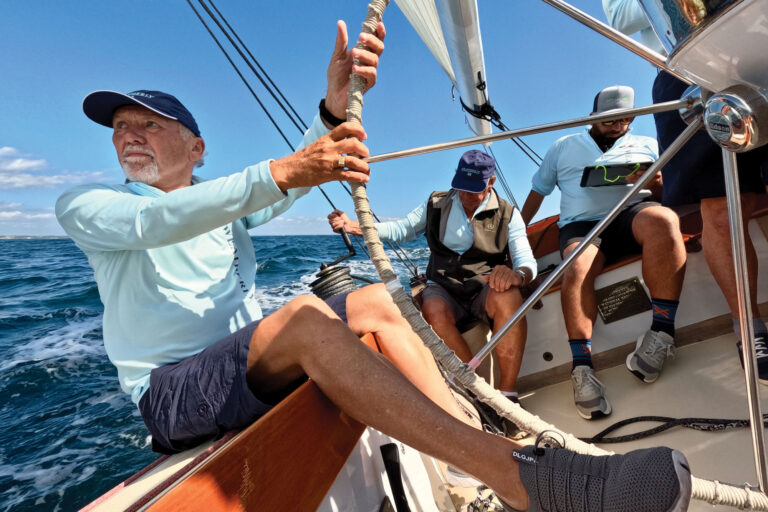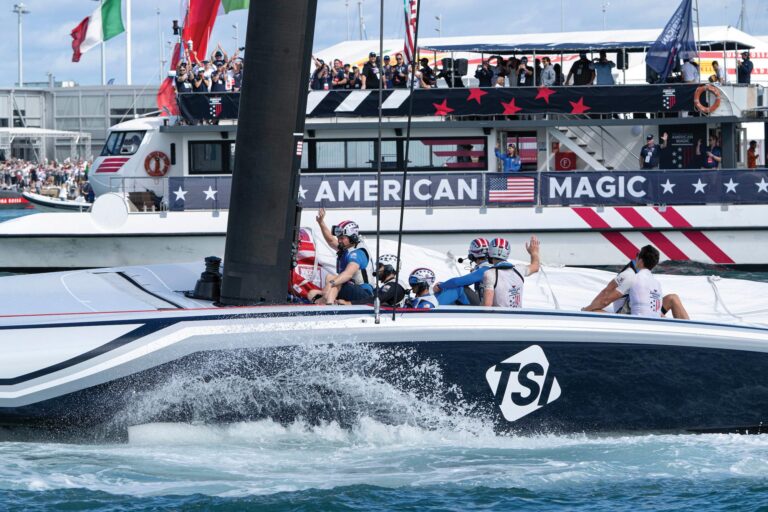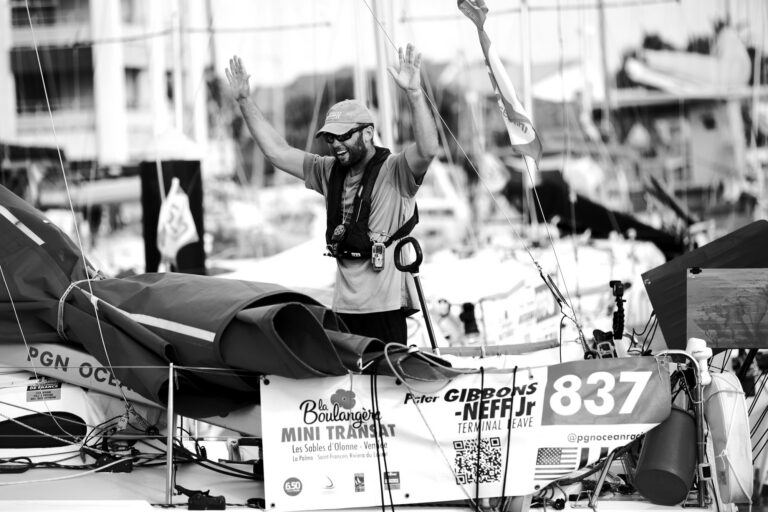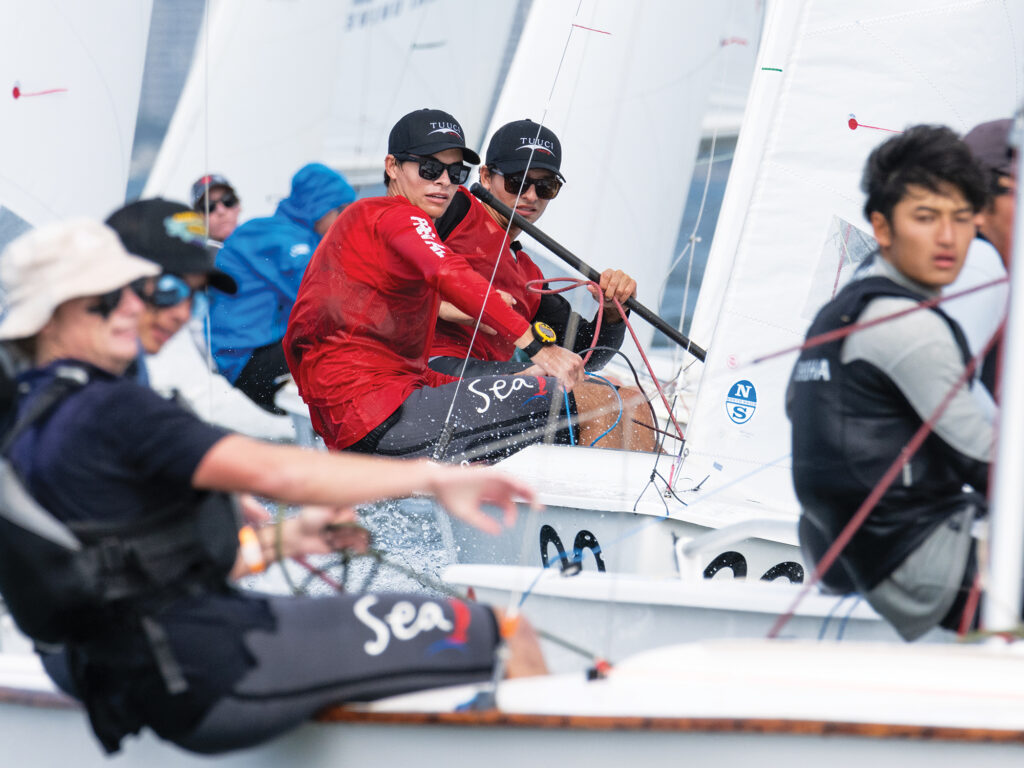
It’s a cold winter day in Boston, but it’s also the first practice session of the season for the Harvard sailing team’s twin brothers, Justin and Mitchell Callahan. They’re anxious to get on the water, but the wind is gusting to 25, whistling through the city streets. The air temperature is 36 degrees, but the Charles River is frozen, so the sailors transport nine dinghies to Boston’s frigid harbor to practice. It might be a frigid one, but it is just another day in the sailing life of these 21-year-old juniors who have been racing since their earliest days. Both have high aspirations in sailing and their careers after college, and both are off to incredible beginnings.
Justin and Mitchell grew up sailing in Miami and Newport, Rhode Island, and have been able to sail year-round. The fraternal twins speak with an engaging smile and are genuinely enthused about racing and their future. The young men are different in stature—Justin is 5’10” and weighs 148 pounds, while Mitchell is 6’3” and weighs 180. While different in their appearances, they’re equals as students of the physical and mental aspects of competitive sailing, thriving in the crucible of high-level collegiate racing.
Justin shares his philosophy: “The hardest part about college sailing is to never get flustered because there are so many races, and you never know what is going to happen. There are no drops. Consistency is what’s so important in college sailing. That, and keeping a level head.”
Justin and his Harvard sailing crewmate, Kennedy Leehealy, won three of the final five B Division races to secure Harvard’s national championship victory this past spring. “Having great teammates is the number one thing,” Callahan says. “I’ve had the same crew throughout college. We’ve been sailing together for two and a half years, and we feel like two peas in a pod. Whether we are first or last, we feel like there’s more to do, more to gain.”
Mitchell thrives in the team environment of college sailing. “I’m a big team-sport person,” he says. “I also played lacrosse outside of sailing. I just love the team aspect. In team racing, there is always the right play. In fleet racing, it’s a little more arbitrary, where you can get a shift, you can get unlucky. In team racing, the chances of winning the race are elongated. The main goal is to try to extend the success rate of plays for as long as possible. There’s always a right thing to do, and then you have your teammates with you.”
“[Harvard coaches] Mike O’Connor and Bern Noack have been with the team for 29 years and are really helpful in practice and at regattas,” Justin says. Recently, veteran college coach Stan Schreyer joined the Harvard coaching staff.
Justin says that he became comfortable working with coaches at a young age. “Lior Lavie has been equally influential in our sailing. We owe a lot of our success to him. He has coached me and Mitchell since we were 10 years old.”
Lavie worked with the boys when they were sailing at Immaculate LaSalle High School in Miami. In 2022, Lavie was named coach of the Cornell University Sailing Team, and previously he was a member of the Israeli Olympic sailing team (2004-11).
Mitchell had a different path in sailing than his brother, but when they’re together in a boat, they’re certainly always faster. “Right after my growth spurt, I hopped into the Laser and out of 420s. More recently, my brother and I started sailing Snipes as well, which is an absolute blast. They’re very technical boats, which we like.”
And that’s to say they won the 46-boat 2024 Snipe Junior World Championship by a whopping 13 points.
Mitchell works hard at physical training and observes that many of his peers simply apply themselves in practice, but that’s about it. “I am very big on personal wellness and mindfulness,” he says. “I eat a very clean diet, just meat and vegetables. I exercise every day, whether that’s cardio or lifting weights in the gym. I ran a marathon last spring, and I’m currently training for another in Boston. I practice mindfulness and mediation, not only for sailing, but for life in general. It really helps me a lot. So, when I get on the racecourse, it’s just me in the boat, because sailing is about feel, and you try to get in that flow state.”
Justin, meanwhile, sees himself as a student of high-level sailing. “I’ve watched every sailing YouTube video on the planet, from the America’s Cup to Olympic medal races to top-level match racing. I look up to sailors like Tom Slingsby, Peter Burling and Dennis Conner and the heart they took to the sport, and I try to emulate that as much as possible.”
Justin and Mitchell’s parents, Paul and Alisa Callahan, have been strong supporters of their sailing development. Paul Callahan was injured at the age of 21 and has been a quadriplegic ever since. He runs the organization Sail to Prevail, with sailing operations in Newport and Miami that enable disabled sailors to get an opportunity to be on the water. Callahan has also twice competed in the Paralympics.
“Growing up with a father in a wheelchair teaches you to think about someone else first,” Justin says. “You never put yourself first. For me and Mitchell, we’ve learned that there’s no such word as ‘can’t,’ and you can always do anything you set your mind to. He was disabled at my age now, and the life he was able to put together is a testament to his mindset. He was able to work on Wall Street. He graduated from Harvard Business School, he raced in two Paralympics, and he raised a family. I couldn’t ask for a better father. There is no one else who I’d rather have on my side.”
Mitchell adds: “I attribute 99 percent of my and Justin’s success to our support system, mainly our parents, and then our coach, Lior, who is not only a talented sailing coach, but he is also one-of-a-kind with the psychology of the sport. If we win a race, he might scream at us, and if we come back after a black flag start, he’ll hug us and say: ‘OK, let’s reset. Let’s move on.’ He never lets us get too high or too low. It’s really ingrained in us, and I can hear him in my head after a good race, or a bad race.”
Mitchell and Justin are thriving at Harvard, as adept at their studies as they are with racing. “The school has so much to offer,” Mitchell says. “There are tremendous opportunities, whether academic, athletically or even socially. There’s a unique mix of people at the school from all over the world, and it’s kind of like sailing when you go to an international regatta. They offer unique perspectives.”
After college, Mitchell plans to shift to his professional advancement, a career in either private equity or consulting. “I haven’t figured it out yet, but that’s what I’ll be doing,” he says. “Hopefully, I will end up at Harvard Business School. I will keep racing, doing the Hinman Team Racing Championship and match racing, regardless of Justin. I’m definitely switching gears for my business career.”
Looking toward his own future, Justin aspires to racing at a high level. “My long-term aspirations are being in the America’s Cup, being in SailGP, being at the pinnacle of the sport, representing the United States in some capacity. I think that is a huge honor. I’m considering the LA 2028 Olympics, possibly in the 470 class, but it’s very much a thought right now. Beyond that, I would like to go to law school.”
At this writing, Harvard is ranked No. 1 in college sailing. Both Justin and Mitchell are quick to point out the large pool of great collegiate teams racing these days. Like all college sailors, they thrive on the competition and the friendships that last a lifetime. They are keen to have another successful year on the water, and when the ice does finally clear on the Charles, you can bet they’ll be straight into it.

